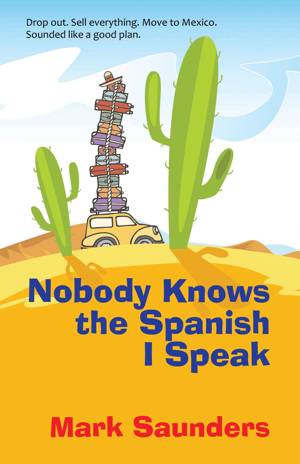
- Afhalen na 1 uur in een winkel met voorraad
- Gratis thuislevering in België vanaf € 30
- Ruim aanbod met 7 miljoen producten
- Afhalen na 1 uur in een winkel met voorraad
- Gratis thuislevering in België vanaf € 30
- Ruim aanbod met 7 miljoen producten
Omschrijving
Nobody Knows the Spanish I Speak is a humorous memoir about dropping out late in life, selling almost everything, and moving to the middle of Mexico, where you don't know a soul and can barely speak the language. The story arc of the memoir is a simple one: the author and his wife lose their jobs, drop out, and move to Mexico (Act 1); they experience conflict, both good and bad, before moving back to the United States (end of Act 2); finally, they resolve their biggest conflict by moving back to Mexico (Conclusion), where they hoped to stay longer this time.
The author and his wife were the last persons they ever thought would drop out and move to Mexico, especially when they did. They were in their late 50s at the time, did not have much money to fund the move, and were not the adventurous types. They were both working in high-tech, for different companies, and coincidently their jobs were going away around the same time. They felt boxed in—or out. So, they sold their condo in downtown Portland, Oregon, with the spectacular view of Mt. Hood and Mt. St. Helens and lived in Mexico for two years off the proceeds of the sale. Put another way, they gave themselves a self-funded, open-ended sabbatical. Funny things happened to the couple almost immediately. The author started writing about what was going on, from the point of view of someone who was totally ill-equipped and ill-prepared to live in a foreign country.
In violation of such mainstream media expectations, in moving to Mexico they didn't get car-jacked, kidnapped, mistakenly shot at, or ripped off by a shady contractor hoping to live in Panama on their life savings. They had, however, many mishaps, made some dreadful mistakes, got in and out of trouble, and learned a thing or two about life, Mexico, and each other. Even though the memoir reenacts no homicides or rescue attempts, their story covers plenty of interesting ground, landscaped with prickly pear cactus, scorpions, mammoth speed bumps, lung-choking dust, yoga, disco, firecrackers, car repairs, lost-in-translation moments, and a near-death collision on a two-lane highway. All right, that last bit is an exaggeration. The two six-wheelers missed them by a good five inches.
The couple discovered they were living in a cash-based society where nobody ever had change. In a culture where mañana did not always mean tomorrow but could mean anything from later to not now to fat chance you'll ever see me again. In a country where the most common unit of measurement was not the kilo or the kilometer, as guidebooks would have you believe, but something known as más o menos, simply translated as "more or less."
Specificaties
Betrokkenen
- Auteur(s):
- Uitgeverij:
Inhoud
- Taal:
- Engels
Eigenschappen
- Productcode (EAN):
- 9781737515555
- Verschijningsdatum:
- 19/06/2023
- Uitvoering:
- E-book
- Formaat:
- ePub

Alleen bij Standaard Boekhandel
Beoordelingen
We publiceren alleen reviews die voldoen aan de voorwaarden voor reviews. Bekijk onze voorwaarden voor reviews.









